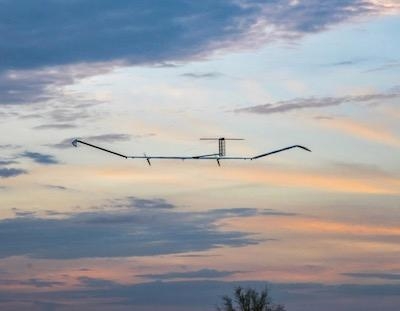Fri, Aug 10, 2018
Touched Down After First Flight Lasting 25 Days, 23 Hours, And 57 Minutes
Airbus Defense and Space announced the successful landing of its first production aircraft of the Zephyr program, the new Zephyr S HAPS (High Altitude Pseudo-Satellite). After taking off on July 11th in Arizona, Zephyr S logged a maiden flight of over 25 days, the longest duration flight ever made. An application has been made to establish this as a new world record. This maiden flight of the solar powered Zephyr S proves the system capabilities and achieved all the flight’s engineering objectives.

The previous longest flight duration record was also logged by a Zephyr prototype aircraft a few years ago, achieving then more than 14 days continuous flight, which already was ten times longer than any other aircraft in the world.
This new record flight was supported by the UK government and reflects the U.K. Ministry of Defense’s position as the first customer for this innovative and potentially game changing capability.
Zephyr is the world’s leading, solar–electric, stratospheric Unmanned Aerial Vehicle (UAV). It harnesses the sun’s rays, running exclusively on solar power, above the weather and conventional air traffic; filling a capability gap complimentary to satellites, UAVs and manned aircraft to provide persistent local satellite-like services.
“This very successful maiden flight represents a new significant milestone in the Zephyr program, adding a new stratospheric flight endurance record which we hope will be formalized very shortly. We will in the coming days check all engineering data and outputs and start the preparation of additional flights planned for the second half of this year from our new operating site at the Wyndham airfield in Western Australia” said Jana Rosenmann, Head of Unmanned Aerial Systems at Airbus.
Zephyr will bring new see, sense and connect capabilities to both commercial and military customers. Zephyr will provide the potential to revolutionise disaster management, including monitoring the spread of wildfires or oil spills. It provides persistent surveillance, tracing the world’s changing environmental landscape and will be able to provide communications to the most unconnected parts of the world.
(Image provided with Airbus news release)
More News
Airplane Bounced About 3 Ft Then Touched Back Down And Then, With No Brakes Applied, The Airplane Began Veering To The Left Analysis: The pilot entered the airport traffic pattern >[...]
Aero Linx: British Microlight Aircraft Association (BMAA) The primary focus within all aviation activity is SAFETY. In all aspects of our sport SAFETY must come first, whether it b>[...]
From SnF25 (YouTube Edition): William Wynne Builds Practical Aircraft Engines on the Corvair Platform Seeking an affordable alternative to the traditional aircraft engine options, >[...]
How To Get A Story On Aero-TV News/Feature Programming How do I submit a story idea or lead to Aero-TV? If you would like to submit a story idea or lead, please contact Jim Campbel>[...]
From 2023 (YouTube Edition): Bridge of CiES CiES Inc. is a Bend, Oregon-based designer and manufacturer of modular embedded aircraft systems and sensors. The company’s fuel-l>[...]
 NTSB Final Report: Aviat A1
NTSB Final Report: Aviat A1 ANN's Daily Aero-Linx (07.08.25)
ANN's Daily Aero-Linx (07.08.25) Classic Aero-TV: Fly Corvairs Reliable Engine Alternative
Classic Aero-TV: Fly Corvairs Reliable Engine Alternative ANN FAQ: Contributing To Aero-TV
ANN FAQ: Contributing To Aero-TV Classic Aero-TV: CiES Fuel-Quantity and e-Throttle Systems Praised
Classic Aero-TV: CiES Fuel-Quantity and e-Throttle Systems Praised



